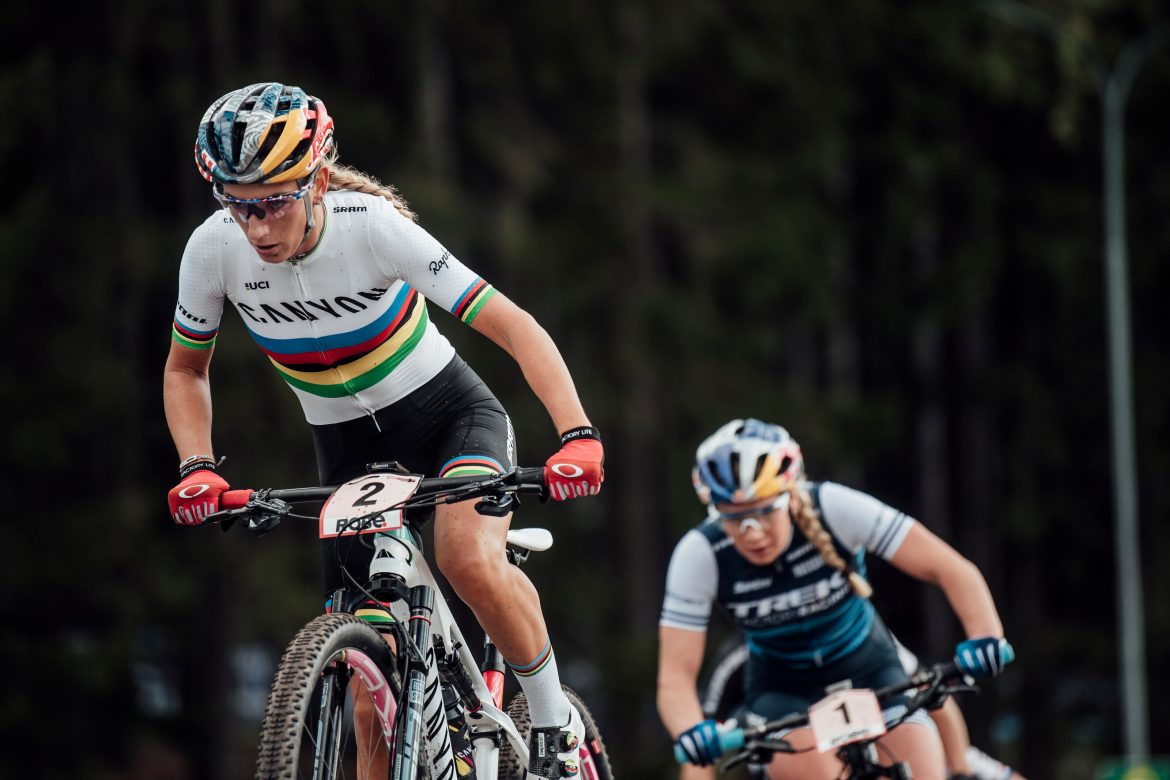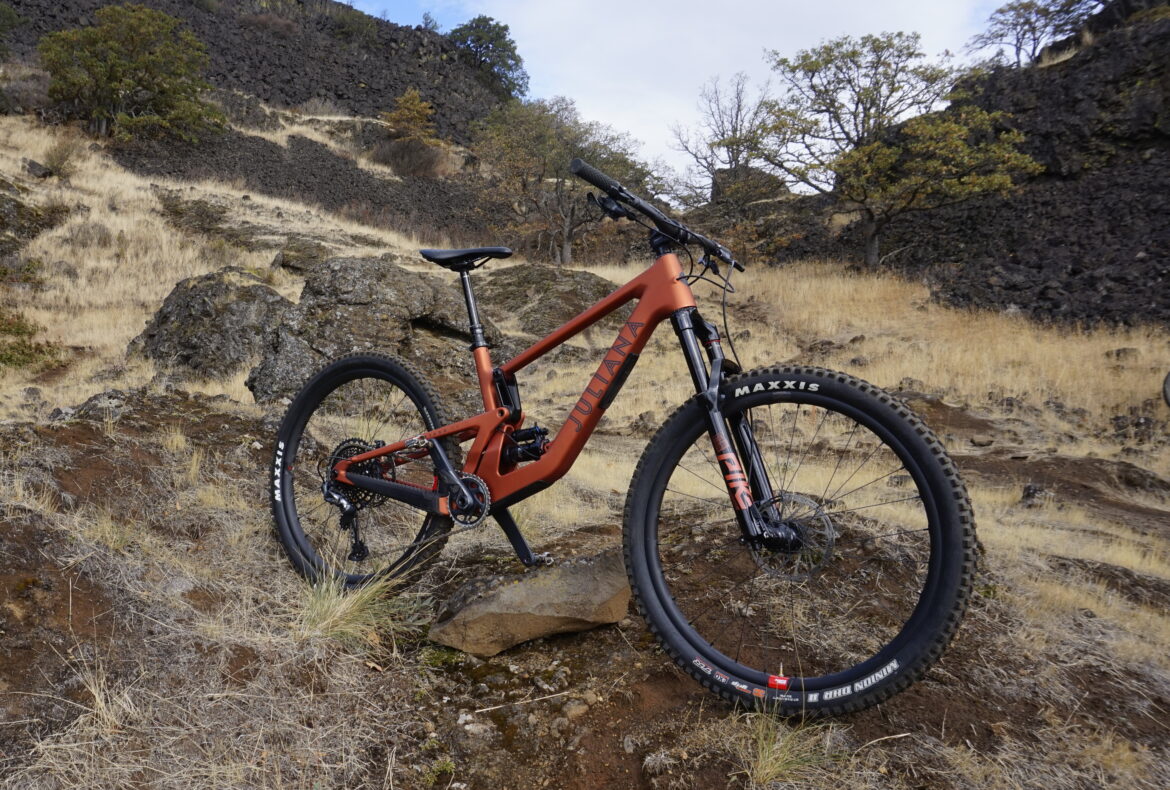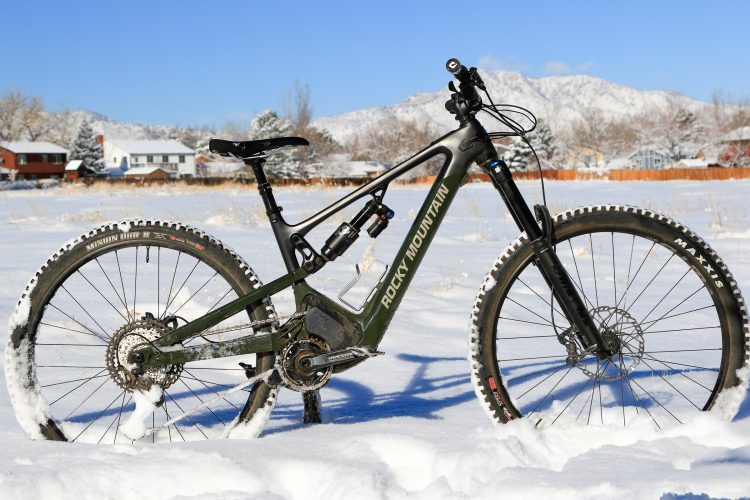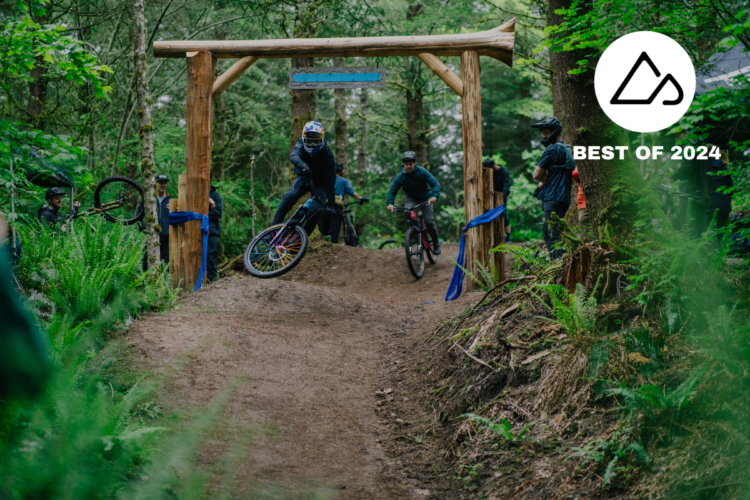
Lately, I find myself very encouraged by the sheer number of women I see in the mountain bike community. Ripping up the trails, picking up shovels, designing gear, hosting events and crushing races. It’s taken a long time, but we’re that much closer to breaking gender barriers and records alike with every woman who gets on a bike and discovers the thrill of mountain biking. So this International Women’s Day, I wanted to focus on the positive and celebrate women on bikes.
We spoke to five seriously badass women about the events that earned them a spot in MTB history, and opened the door for more women in mountain biking in the process.
Juli Furtado: Pure Domination
First-ever elite women’s Cross-Country World Champion | Guinness World Record for most career 1st-place finishes | First women’s specific mountain bike
In the 1990s and perhaps still to this day, there was no rider, male or female, as dominant in XC mountain biking as Juliana “Juli” Furtado.
The New York native kicked off her international athletic career when she joined the US National Ski Team at just 13 years of age. And for the next 7 years, she remained the youngest member of the team.
However, numerous knee injuries and surgeries put her out of competition. Inspired by the Coors Classic, she started biking while still on a college ski scholarship. And despite being a total newbie, Furtado burst onto the cycling scene, winning the U.S. National Road Champion in 1989 during her first year of competition.
“It was a bit of a mistake. A total fluke,” Furtado told Singletracks over the phone. “I couldn’t sprint to save my life, I still can’t. I won from a breakaway.”
She may have been new, but this was anything but a fluke.
Shortly after road nationals, Furtado started mountain bike racing and again, despite being in her first year of competition, scored herself an invitation to the first-ever UCI World Mountain Bike Championships in 1990.
Held in Durango, Colorado, this newbie soloed into the history books as the first-ever elite women’s Cross-Country World Champion. kicking off a career so dominant that she was awarded a Guinness World Record for most career 1st-place finishes in MTB —male or female.
Her winning streak includes three World Cup series titles, five national championship jerseys, the 1992 World Downhill Championship, and an astonishing 12 consecutive races in 1992-93 while racing for GT.
She was widely favored for the gold medal at the first-ever Olympic Cross-Country Mountain Bike race in Atlanta in 1996, but illness kept her out of the running.
Following the Atlanta Olympics, Furtado, who was still just 30 at the time, was diagnosed with Lupus, ending her career prematurely.
“I thought I could still race for a little bit but I couldn’t so my career was actually very short and people kind of forget that,” said Furtado. “And it was quite unfinished in my view. I wish it had been a lot longer.”
But it’s a career she looks back on with a lot of pride, listing the World and World Cup series titles among her highlights.
“The biggest career highlight was Durango but also the World Cup titles because for me that meant you truly were the best rider because it took place over a whole year, not just one day,” she said. “The first two years I lost it on the last day so to win those titles, for me, was quite big.”
When asked about her World Championship win as a complete newbie, Furtado recalled feeling disbelief.
“I was still quite new to the sport. I had shown promise but I was still very much a ski racer at the time,” she said.
Laughing, she recalled mostly what happened after she crossed the finish line:
“I remember finishing and just being a little bit in shock. And I was also a smart ass and when I finished, someone of the press asked me, ‘how does it feel?’ And I was like, ‘How do you think it feels?!’ I think it came off the wrong way. I just meant like, ‘picture yourself winning this.’ It was unreal. So that’s something I wish I could relive because I would answer differently. It was just so surreal to me.”
While Furtado’s racing career was short-lived, the lasting impact is still very much apparent today. Since we’re talking about women making MTB history, we’d be remiss if we didn’t mention Furtado’s next move: her namesake bike brand.
In 1999 Santa Cruz premiered the industry’s first women-specific mountain bike, the Juliana.
“When I retired, I just knew I didn’t want to do the kind of standard ‘endorse product and just talk about myself and my career’ kind of thing,” Furtado explains. “Instead, I was able to use my name with a new concept for the first women’s specific model, which then I had to convince Santa Cruz was a legitimate business path, which took quite a bit.”
“But I have a business degree and for me to be able to apply my business knowledge and use my name in a way I want to was a huge accomplishment. And after that other companies started doing women’s specific products and it became a real market so yeah, I am absolutely proud to be the first to realize that that was a market.”
Check out Singletracks’ review of Juliana’s latest model, the 2021 Furtado, here.
Susan DeMattei: Olympic Glory

Medaled at the first-ever Olympic mountain bike race, (while Paola Pezzo took the Triple Crown)
The 2021 Tokyo Olympics, if they take place, will mark the 25th anniversary of the first Olympic mountain bike events. It was in sun-soaked Atlanta, Georgia, in 1996 that 43 men and 27 women were given the first chance to vie for Olympic gold.
With little elevation to play with, the race took place on a power course. Twisty, harsh and fast, the course was unforgiving and mistakes were costly. When the gun went off in the women’s race, just 20 miles (31.8km) of racing lay between the starting line and an Olympic medal. And while American XC super star, Juliana Furtado, was heavily favored to win, this was simply not her day.
Instead, Italian Paola Pezzo confidently rode herself into the history books, claiming the first Olympic mountain bike medal on her way to also becoming the first and only rider to have ever won the “Triple Crown” of mountain biking: winning the World Championships (in 1993 and 1997), Olympic Gold and the Grundig World Cup title (in 1997).
On the Olympic podium, Pezzo was joined by Canadian Alison Sydor in second and American Susan DeMattei in third. DeMattei’s first-ever Olympic mountain bike bronze medal is a feat that only seemed to grow in significance over the years, as it took 16 years — 4 games— for another American to earn an Olympic mountain bike medal. This was at the 2012 Summer Games in London where Georgia Gould claimed America’s second Olympic bronze mountain bike medal.
Despite her Olympic success, DeMattei stuck to her plans to retire that year with the intention to start a family and swap her lycra back to her nurse’s scrubs. Even 25 years later, she remembers her part in that historic race as though it was mere weeks ago.
“I was confident and calm prior to, and during, the race. Had a terrible start but worked back up to the front, knowing that if I did that, I should be able to land a podium,” DeMattei recalled.
“On the last lap, Paula Pezzo and Alison Sydor were too far ahead to think about reeling in, but Gunn Rita was with me and I was entertaining thoughts of finishing fourth. I can’t sprint to save my life, so I figured that if it came down to the finish line, I’d be trailing. Instead, I kept my head down and just rode the best I could, and after climbing the last hill, short but steep, she was nowhere in sight. Couldn’t believe it. Came over the finish line and couldn’t have been more overjoyed.”
In addition to ending her career on a very high note, DeMattei said she feels proud and privileged to have been part of that historic event and to have been able to represent the US and help bring international exposure to the sport.
“When I think about that race now, I smile and remember how much fun it was to get to race with those women, see those beautiful venues around the world, and work hard at something I still love to do,” she said.
Pauline Ferrand-Prévot: Rainbows Across the Board
Won the UCI World Road, Cyclocross, and Mountain Bike title, all in one year

As if being the best in one cycling discipline isn’t impressive enough, meet Pauline Ferrand-Prévot. When the 2021 UCI XCO series kicks off in Germany this May, the 29-year-old French woman will once again be wearing the coveted rainbow stripes.
She’s already got six Elite World Championship titles and 13 national titles to her name across the road, cyclocross, and mountain bike cycling disciplines. It seems that no matter what kind of bike you put her on, she’ll be a contender for the win.
She proved this in 2015 when, at just 23 years of age, she became the first person ever – in the history of cycling – to simultaneously hold the World road, cyclocross, and cross-country mountain bike titles. In other words: World Champion across the board.
But it wasn’t all sunshine and rainbows.
At the Rio Olympics in August 2016, Ferrand-Prévot abandoned the women’s cross-country mountain bike race midway through. She dismounted her bike and left the venue without a word.
“Being World Champion in three disciplines in one year may have been the worst thing that ever happened to me,” Ferrand-Prévot later penned in a heart-breaking social media post. “Even injured I was working harder every day without giving up. I abandoned race after race, saying that fate would eventually stop…I end my season on abandonment. I do not know when I will get back on a bike. The bike was what I loved to do the most, but it became my biggest nightmare.”
With mounting pressures, Ferrand-Prévot had fallen into a vicious circle of injuries, overtraining, failed treatments, and constant disappointments. Following her abandonment in Rio, Ferrand-Prévot almost walked away from the sport forever but slowly learned how to rekindle her love for cycling, and mountain biking specifically.
Ferrand-Prévot chose to focus on mountain biking as her primary discipline and also underwent several iliac artery endofibrosis surgeries to deal with pain and circulation problems she had experienced since 2015. Dealing with surgeries and the subsequent recovery meant that the 2017 and 2018 seasons were spotty, though only when compared to her own past, as she still won National titles and bronze and silver at the UCI World XCO Championships. But by the 2019 season, Ferrand-Prévot was back on top, winning back-to-back World Championships.
Today, Ferrand-Prévot can look back on her historic 2015 accomplishment, and the painful 2016 season that followed, with less bitterness, calling it a great lesson instead of a nightmare.
“Though [2016] was the toughest one I had to live, it’s also been the greatest lesson I could have. This led me where I am now, enjoying every moment on my bike, living my passion fully, and working for another Olympic dream,” Ferrand-Prévot told Singletracks.
“I’m super proud of my three different titles, but I must admit it was also too much for my body. But that’s how you learn… and why I do things differently today.”
In 2021 she’s looking to redeem her Olympic appearance. She’s not afraid to put her ambition out there and work exclusively —and happily — toward that one goal.
“I won’t hide that an Olympic medal is my goal, because I’m that kind of person who wants what she doesn’t have yet,” she said. “And that is a great motivation for me. I’m loving the way I have to work to arrive at my best at the Olympics!”
The Formation: A Freeride First

In October of 2019, a group of women trekked into the Utah desert — shovels, mountain bikes and camera crew in tow — to prove once and for all that women belong in the Freeride world.
And what better location than the original site of the (in)famous Red Bull Rampage. Held since 2001, the Red Bull Rampage is arguably the biggest and gutsiest high-risk mountain bike contest there is. At Rampage, the best mountain bike athletes design and physically carve the most jaw-dropping chutes, lines, and jumps inside jagged, desert mountain rides. They then try to impress a panel of judges by not just riding those lines but doing all sorts of death-defying tricks and flips along the way.
Rampage is an invite-only event and in its 14-edition history, no woman has ever competed.
So in 2019, after some 10 years of planning, researching and designing, freeride veteran Katie Holden brought together six of the best female mountain bikers, as well as other female athletes, to build out and ride the sport’s most extreme lines.
Rather than waiting for an invite, Holden decided to start a women’s extreme freeride event to stand all on its own.
“It had been my personal goal for a long time to compete at Rampage one day but long story short, I didn’t have what it takes. But I learned a ton in the process and over the course of those 10 years, I had collected so many journals and notes, and I had wanted to do something with it because that area [Virgin, Utah] is really special,” Katie Holden told Singletracks.
“I know women can ride out there, and ride it really well. There’s so much talent on the rise in women’s freeride, but there’s not really a place for them to show it.”
And so, with the world watching, they built a stage for themselves.
“First and foremost, our goal was to prove, and to showcase that women belong there, and they are capable of riding that stuff super well with a lot of power and grace and confidence,” said Holden.
“It’s one thing if it’s one woman doing it, but once you have a group of women that are really performing to the highest degree, collectively as a whole, it really makes quite a statement.”

Not only that, it showed what’s possible for the development — the future — of women’s freeride.
Holden said the impact of Formation was immediate and significant.
“There’s been a lot more spotlight on and opportunities for women’s freeriding. For so long, the only real avenue for women to have a professional career was through racing and I think that Formation at least contributed to helping to create different career paths for women,” she stated.
What’s more, we have more showcasing to look forward to. Details remain a secret, but Holden revealed that a Formation 2.0, now called Red Bull Formation, will take place in 2021.
Lael Wilcox: Going the distance
Lael Wilcox takes on the whole field in ultra-endurance cycling

Lael Wilcox was 27 when she entered her first bike race in 2014. A bike commuter from Anchorage, Alaska, Wilcox decided to tackle the 50-mile Frosty Bottom fat bike race just for fun. A 400-mile race followed just a few months later. This time it was on a road bike, borrowed from her mother the night before. With a ride time of some 27 hours, she was the first woman to cross the line, and second finisher overall.
In the two years that followed, Wilcox spent an unimaginable amount of miles and hours in the saddle, any saddle, really. Swapping from road bikes to gravel and mountain bikes in the loooong pursuit of besting the competition, and all the competition.
In 2015, she covered the length of the United States, North to South, while tackling – and setting a new women’s record at— the Tour Divide, a 2,750-mile mountain biking ride traversing the length of the Rocky Mountains, from Canada to the Mexican border.
That next year, she went West to East, rocking the ultra-endurance world when she became the first woman ever to win the Trans Am Bike Race, a self-supported, 4,200-mile ride from Astoria, Oregon to Yorktown, Virginia.
Cementing herself as the best ultra-endurance cyclist in the world, Wilcox also co-designed and set the fastest known time (FKT) for the the Baja Divide, a 1,700-mile route through Baja California. It took over 4,000 scouting miles over six months to complete the route. And when it was time for her to tackle the course in 2017, she completed the ride in 11.5 days.
“I no longer have the record. A year after I rode it, a guy named Pete Bassinger went back and broke my time by an hour and a half. Ouch!” Wilcox told Singletracks.
She finished second overall in Switzerland’s Navad 1000 bikepacking race and in doing so, became the second woman ever to even complete that event.
She bested the women’s field at the 350-mile Dirty Kanza XL gravel race — for which she rode the 650 miles to the starting line in Kansas from her sponsor’s headquarters in Louisville, Colorado.
She finished second overall in the 2019 Silk Road Mountain Race in Kyrgyzstan, becoming the second woman ever to even complete the course.
Despite her small stature, quiet demeanor, and humble and kind nature, Wilcox is a fierce competitor who can push her mind, body, and bike to a place where very few have gone before — especially when she’s told she or women in general can’t do something.
“I guess ultimately, I’m thrilled to race the full field in ultra-endurance events. I’m always going for the overall win. I don’t think I’m unique in my ability to beat all of the guys. I just think there aren’t that many women entering these races,” Wilcox explained.
“I’m extremely motivated to encourage more women to get out there, primarily to take on personal challenges and have fun, but if they’re keen on racing, they should go for it! Part of my inspiration to work hard and do my best is that I’ve been told I couldn’t possibly win, or sometimes even finish. Otherwise, I’m actually just really happy to be out there and find racing really exciting.















2 Comments
Mar 9, 2021
Mar 11, 2021